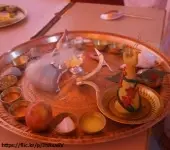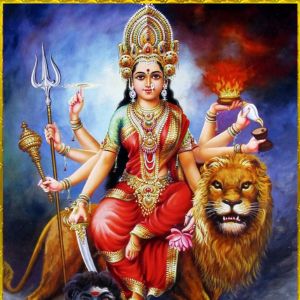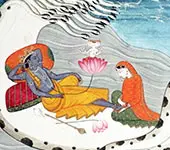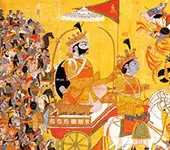Yayati's Story
Recommended for you
Is Brahmastra a nuclear weapon?

The answer is no. Brahmastra is a weapon based on the power of the Gayatri mantra.....
Click here to know more..Shoolini Durga Mantra for protection from negative energies

jvala jvala shoolini dusht'agraham hum phat' svaahaa....
Click here to know more..Venkateswara Karavalamba Stotram

shreesheshashailasuniketana divyamoorte naaraayanaachyuta hare nalinaayataaksha.....
Click here to know more..Excerpt
Excerpt
Yayati's story from Mahabharata is quite famous.
The king who exchanged his old age with the youth of his son and enjoyed life for a thousand more years.
In fact, it was not just for enjoyment, we will come to that later.
Yayati was the husband of Devayani, the daughter of Shukracharya.
He got involved with Sharmishta, the Asura princess.
Instigated by Devayani, Shukracharya cursed Yayati and he became prematurely old, all of a sudden.
Yayati begged for mercy.
Shukracharya said, I can not withdraw the curse but you can exchange your oldness with someone's youth if somebody becomes ready to do that.
Yayati had five sons.
Sons are your closest relatives.
In fact, a son is your own rebirth.
A son is you yourself - आत्मा वै पुत्रः
So Yayati called his eldest son Yadu and told him - I am not yet satisfied with my youthful life.
I want live 1000 yeas more as a young man.,
So if you will exchange your youth with me, when I retire I will return the youth to you, you will not only inherit the kingdom, but also earn a lot of puya for serving your father and you will also become famous for that.
Yadu said - Old age makes the body weak, there are wrinkles on the skiing, nobody would like to look at an old ailing man.
It is a miserable sight.
I can't do this.
Yayati made the same offer to his second son Turvasu.
He said - Old age destroys the fun of living, I can't do this for you.
Yadu and Druhyu were Devayani's sons.
Then Yayati called Sharmishta's 3 sons from him.
The first one Druhyu said- I won't be able to ride a horse or enjoy with women.
No, I won't do it.
Then he called Anu.
Anu said - Old people can't even maintain hygiene.
Even they can't eat and drink properly.
They can't do even rituals such as Agnihotra.
No I don't want oldness.
Then Yayati called his last son Puru.
Puru said - I will do as you say.
Yayati became happy and blessed him.
After receiving youth from Puru, Yayati did not just go around after sensual pleasures.
He performed yajnas, propitiated forefathers,entertained noble guests, took care of his subjects very well.
He was a very kind ruler, at the same time, he controlled crime and destroyed enemies.
Everyone in his kingdom was happy.
See, this is one issue.
Yayati has always been portrayed as a symbol of lust.
He exchanged his oldness with his son because he was lustful.
No, that's not the case.
He was not satisfied with the worldly life he had lived thus far.
He had not completed his duties as a king.
Later, we see that Yayati went to Swarga.
Swarga is for people who lived their life well, righteously.
Earning wealth (artha) and achieving desires (kama) are definitely two goals of human birth, two among the purusharthas.
Why?
Because by doing these is how you purify yourself internally.
It is through actions you perform for these two, you purify your mind, keep it pure and also establish a stable intelligence (buddhi).
There are many who have relinquished the world prematurely without getting sufficient exposure and experience.
Down the line, after decades you will see that many of them are not capable of facing small challenges, they are angry, they are frustrated.
If you go on doing karma, then karma itself will leave you after some time.
You don't have to leave karma.
That's the right way.
If you are scared of karma, that it will entangle you, then that's never going to leave you.
Yayati was unsatisfied, he thought his training was not complete.
After 1000 years more of worldly life, he relinquished and he went to Swarga.
These are the messages you should learn from Mahabharata, not the plain story.
The intention of Vyasa when he told these stories is to give you these messages, give you this knowledge.
So at the end of 1000 years, Yayati called Puru and said - Son, with your youth, I have achieved whatever I wanted.
Now take back your youth and the kingdom.
A sabha was assembled to announce this.
Interestingly, Mahabharata highlights that people from all the four varnas were represented in that sabha.
Not that only the so called elite class were into decision making.
Yayati's decision was questioned.
Aren't you going against the established raja dharma?
Yadu is the eldest son.
He should become the king.
Yayati explained to them.
Yadu and my other 3 sons, they don't qualify to be called sons.
Parent-son relationship is not just biological.
Someone is a son only if he acts as per the wish of his parents.
Someone is a son only if he acts in favor of his parents.
Only such a person becomes eligible to get all the rights and privileges of a son.
Not just any biological offspring.
Only Puru gave me respect and honored my wish.
He is my only son.
This is very much relevant even today.
There are many who abandon their parents and come back for their property when they die.
Do they really have the right to call themselves sons or daughters?
The members of the court agreed with Yayati.
This was a whole new interpretation of Putra or son.
As per Manu smriti, the eldest son was to become the king.
But Yayati interpreted it differently.
He said the first four are not even sons.
Someone who doesn't act in favor of his own parents, is he going to act in the interest of his subjects and the kingdom?

English Topics
Mahabharatam
Click on any topic to open
- 96 Two Curses That Worked against Karna
- 95 What is behind Calling the Five Brothers the Pandavas
- 94 Give up an Individual IF....
- 93 Fascinating Birth Story of the Kauravas
- 92 Overcoming Grief - Lessons from King Senajit's story
- 91 Yayati's Wisdom
- 90 Yayati's Story
- 89 Brahmacharis Can Bless And Curse
- 88 Human Nature - Comples Mix Of Good And Bad
- 87 Results Of Good Karma
Please wait while the audio list loads..
30
Ganapathy
Shiva
Hanuman
Devi
Vishnu Sahasranama
Mahabharatam
Practical Wisdom
Yoga Vasishta
Vedas
Rituals
Rare Topics
Devi Mahatmyam
Glory of Venkatesha
Shani Mahatmya
Story of Sri Yantra
Rudram Explained
Atharva Sheersha
Sri Suktam
Kathopanishad
Ramayana
Mystique
Mantra Shastra
Bharat Matha
Bhagavatam
Astrology
Temples
Spiritual books
Purana Stories
Festivals
Sages and Saints
